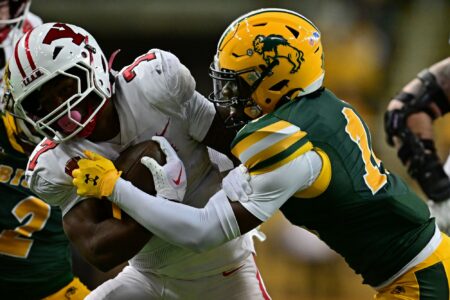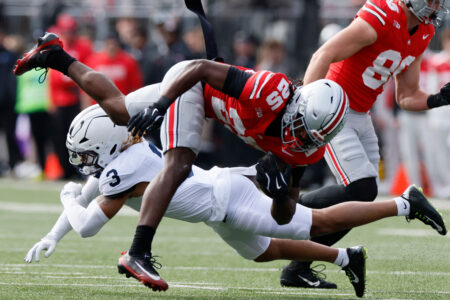Sen. Sherrod Brown brags of ‘Buy America’
Provision part of $1T package on infrastructure

Staff photo / R. Michael Semple U.S. Sen. Sherrod Brown, D-Ohio, left, tours McDonald Steel on Wednesday with President Jim Grasso, center, and director of operations Jerry Moxley, right. Brown took a tour of the plant to celebrate the inclusion of his Buy America provision in the $1 trillion infrastructure package that recently passed both Houses of Congress.
McDONALD — U.S. Sen. Sherrod Brown took a victory lap Wednesday to celebrate what will be the “biggest investment in infrastructure in the nation’s history” and the inclusion of his hard-fought Buy America provision within the $1 trillion infrastructure package.
At McDonald Steel Corporation, the Democrat joined company leaders and members of United Steel Workers Local 1307 and Teamsters Local 377 that represent workers at the plant to discuss the bill that “has the strongest Buy American rules ever passed,” he said.
The provision ensures taxpayer dollars are used to buy America-made products for all federally funded infrastructure projects by closing loopholes and securing investment in U.S.-made iron, steel and manufactured products.
“We used to be the envy of the world when it came to infrastructure,” Brown said. “Our highways, our bridges, our water systems and our ports, and now … we simply have fallen behind. Trump promised infrastructure, didn’t do it. Obama promised infrastructure, didn’t do it. Bush before him promised infrastructure, didn’t do it. It took a new president, and it took a new Senate and a new House to do this.”
The bill contains $110 billion for roads, which includes $40 billion for bridge repair and construction and $66 billion dedicated to improving railroads across the U.S.
Bridges and railroads are the bailiwick industries of McDonald Steel Corporation, making up more than half of the company’s market share.
“That is what we do,” Jim Grasso, president of McDonald Steel Corporation, said. “We do infrastructure primarily for bridges and railroads, so we’re very excited to finally have an infrastructure bill pass out of (Washington) D.C., and hopefully President Biden will sign it quickly.”
The bill cleared the House on a 228-206 vote Friday, ending weeks of intraparty negotiations in which liberal Democrats insisted the legislation be tied to a larger, $1.75 trillion social-spending bill.
The Senate passed the legislation on a 69-30 vote in August after rare bipartisan negotiations, and the House kept that compromise intact.
Biden said after passage in the House he would hold a signing ceremony when lawmakers return from a week’s recess. The bill contains money for roads, bridges, ports, rail transit, safe water, the power grid, broadband internet and more.
At McDonald Steel Corporation, Brown’s Buy America provision is “going to mean more work for steel made in America, more work for USW workers here at McDonald Steel, and job creation up and down the supply chain,” Brown said.
Workers at McDonald Steel Corporation make dozens of components across multiple applications. For bridges, the company produces expansion joints and decking while in the railroad industry, it makes parts that are used for tracks and on railroad cars.
“That’s what makes McDonald Steel so unique: We are a job shop; we are a boutique steel mill,” Michael Havalo, vice president of sales and marketing, said. “Instead of, you go into a hot-rolled coil facility, they are running the same thing day in and day out. We may run bridge work this week and railroad work next week.”
McDonald Steel Corporation employs about 70 hourly workers and about 15 salaried workers. The hourly workers start at $16.76 per hour and go to $17.87 per hour after 90 days. Depending on job class, an employee could earn as much as $25 to $26 per hour, Jerry Moxley, operations director, said.
The company also has profit sharing and a 401(k) match.
Finding employees, however, has been difficult.
“A lot is word of mouth; some of it we deal with a temporary service and if we like how they work and they progress, we hire them directly from there, but mostly it’s word of mouth,” Moxley said.
Jose Arroyo, staff representative for United Steel Workers, said, “The problem with the labor market right now is it’s very thin. It’s just not McDonald Steel, but most of the other places around, and right around $17 an hour seems like entry-level wage, which is actually up in the area from where it used to be. But we’ve had issues with getting workers just in manufacturing.”



